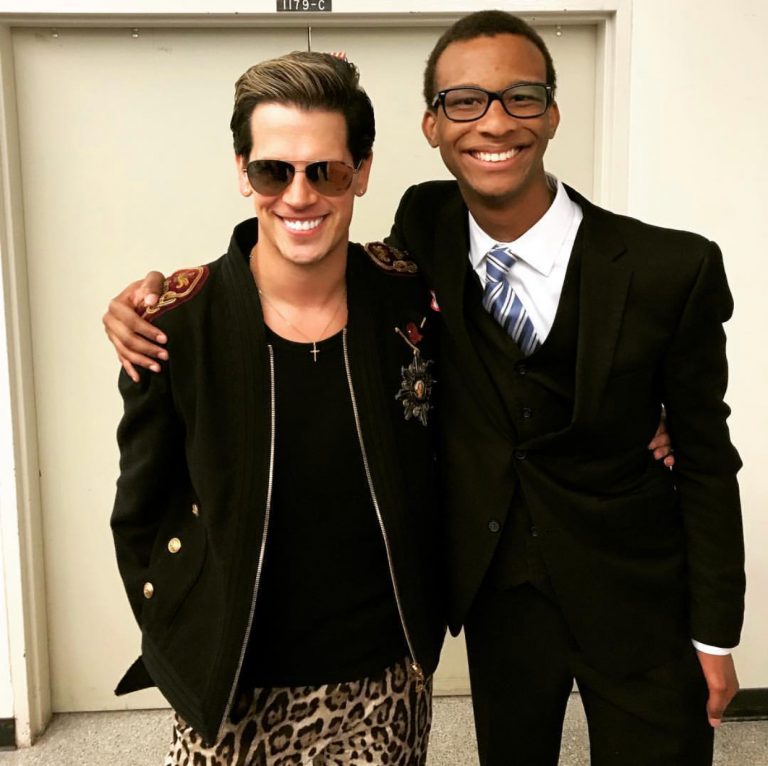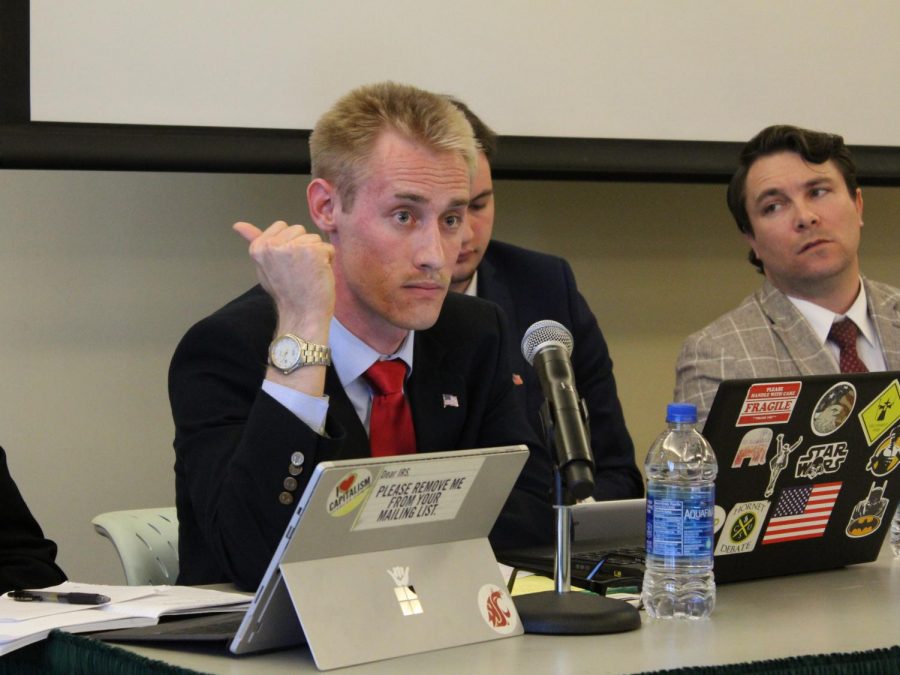Sac State Republican clubs battle for campus representation
Corina Gutierrez – The State Hornet
President of the Hornet Republicans Kyle Shallcross, left, participates in the Great Debate with fellow club member Dean Talley, right, in the Terrace Suite of The WELL on April 17, 2018. The Hornet Republicans have participated in two Great Debates this academic year while the College Republicans have participated in none.
For years, Sacramento State’s Great Debate has served as a chance for the College Republicans and College Democrats to discuss both campus and nationwide issues.
But this year, the views of the right were represented by a new group: the Hornet Republicans Club — the result of a long and acrimonious split from the long-standing College Republicans.
“There were internal politics at bay and we just had two different directions by which we decided to go about,” said Hornet Republicans Club president Kyle Shallcross.
According to College Republicans President Floyd Johnson II, those “internal politics” included claims of embezzlement and general misuse of power against former president Mason Daniels.
Johnson said that members of the club started to question the way Daniels used his presidential power at the California Republican Party convention in February 2017.
“Mason and (College Republicans Treasurer) Gianfranco Ruffino had a disagreement,” Johnson said. “As a result, Mason basically kicked Gianfranco off the Facebook pages, took away his (administrative) privileges, that sort of thing, so he couldn’t make changes or make posts as he’d like to. And that started the whole thing where we started to look at things and question why they were going that way.”
Daniels vacated the position of College Republicans president in summer 2017, according to Johnson. Tom Carroll, the director of Student Organizations and Leadership, would not comment on whether Daniels left of his own volition or was removed.
The schism widened during the 2017 California College Republicans board election. Members had been voted into positions through a straight slate process, but in 2017 voters could choose between people from different slates.
In 2017, the slates were divided between Rebuild, the more conservative group, and Thrive, the less conservative group. Then-president Mason Daniels ran for the Capital Region’s Vice Chair on the Thrive slate, while Johnson ran for the Capital Region’s Vice Chair on the Rebuild slate.

Floyd Johnson II poses with Milo Yiannopoulos at the California College Republican convention held in Santa Barbara on April 7 2018. Johnson is the president of the Sacramento State College Republicans, who did not participate in either of this year’s Great Debates.
“Thrive has a different approach to Republicanism in California — they’re a lot more moderate, I’d say they’re center-right on most of their issues — and they’re for electing Republicans in office,” Johnson said. “Rebuild, on the other hand, had more of an activism approach. I mean, they still believed in the standard approach, but they’re more for bringing the issues to college campuses by inviting speakers like Milo Yiannopoulos and Ben Shapiro.”
The split went right down the middle of the Sac State College Republicans. Daniels ultimately won the Capital Region Vice Chair position — though other members claimed he was ineligible for the position as he was not a member in good standing due to not attending club meetings, according to a complaint filed with the California College Republicans.
With Rebuild-supporter Ruffino serving as the president of the Sac State College Republicans, Shallcross and his allies, who supported the Thrive slate and were sympathetic to Daniels, formed the Hornet Republicans Club at the start of this academic year.
In addition to alleging he was ineligible for office, the formal complaint against Daniels claimed that he created “a division of the status quo” by being involved in the creation the Hornet Republicans Club, and did not return College Republicans club property and the social media channel.
Johnson said that when Daniels left the College Republicans, he still had control of the group’s Facebook page and email and refused to give the remaining members the password to access them.
After the Hornet Republicans Club was founded, Johnson said that Daniels changed the title of the College Republicans Club Facebook page to “Hornet Republicans Club” and removed all members who weren’t in support of him from the page.
The complaint also alleges that Daniels inappropriately took money from the club — a claim that Daniels adamantly denies.
“A lie gets halfway around the world before the truth even gets its shoes on,” Daniels said. “I spent thousands of my own dollars on that club and was never reimbursed. I even proved it with bank statements. In fact, the University even said that the club owed me money but I refused to pursue it because I was tired of dealing with children.”
Daniels said that the accusations of embezzlement have been used as a “talking point” against him.
“It’s sad that after all these years they are still blaming others all because they don’t know what they’re doing and are upset that the (Hornet Republicans) have had more opportunities than them,” Daniels said.
Daniels also said he was not involved in the creation of the Hornet Republicans Club, other than that he supports the group.
The annual Great Debate was hosted last fall by the Social Sciences and Interdisciplinary Studies Joint Council. ASI Director of Social Sciences and Interdisciplinary Studies Jay Passi helped plan the event.
Passi said that he reached out to 50 clubs to participate in The Great Debate in order to gather interest. Four clubs responded, including the Hornet Republicans.
Passi said that he tried to reach out to the College Republicans — though he did not realize they did not have access to the email address to which he sent the email.
So the Hornet Republicans represented the Republican side in The Great Debate. Johnson expressed his displeasure and Passi said he made an effort to reach out to him personally so that the College Republicans could be included in a second Great Debate.
“I decided to email (the College Republicans) an invitation to the next planning meeting, but by that meeting the joint council had already booked the room, they booked the set-up and everything,” Passi said.
Passi said that he proposed compromises to the Social Sciences and Interdisciplinary Studies Joint Council, such as having a three-way debate, or pairing members of the College Republicans with members of the Hornet Republicans.
The former would not have worked, Passi said, due to the time constraints, and the latter would not have worked due to differences in politics between the two clubs.
“I went to Jay’s office hours, and he explained that as it was at that time, they didn’t want you to participate because from what I understand you guys differ in policy, and I said ‘OK, yeah, that’s true, and I understand why you wouldn’t want to split the teams in two,’ ” Johnson said. “Then he told me that the way the format was already decided we wouldn’t be able to fit three teams.”
Shallcross is currently serving as the Director on the Union/WELL Board of Directors. According to Passi, he was present at the Social Sciences and Interdisciplinary Studies Joint Council meetings as the president of the Hornet Republicans, and not in his capacity as a student representative.
“From what I know, they only hold The Great Debate once a year,” Johnson said. “This time, they wanted to hold it twice, and this was from Kyle’s perspective. So because he wanted to set up everything, he went through ASI and he wanted to plan everything, so (the Hornet Republicans Club) were basically given the option.”
Though Shallcross has a relationship with ASI, he, Passi and ASI President Mia Kagianas said that they do not think that his relationship helped him secure his club a spot at the second Great Debate.
“Kyle has been engaged with ASI since the 2017 ASI Elections and is serving as a Director on the Union/WELL Board of Directors, and has worked with the board and I this year,” Kagianas said in an email to The State Hornet. “My understanding is that both clubs were encouraged to participate with no inherent advantages or disadvantages, and none were forced to participate — it was a voluntary opportunity to be engaged and to give organizations the chance to share their values and perspectives.”
When Passi was asked whether or not the College Republicans would have had a better chance of being represented at The Great Debate had they been present at more planning meetings, he said, “possibly.”
Johnson warned that there would be “issues” if the Hornet Republicans Club were to continue to be allowed to participate in campus activities traditionally given to the College Republicans.
“At this point, I thought, forget it. (The Hornet Republicans) don’t have any club meetings anymore, they’re gone by next semester most likely,” Johnson said. “If we don’t get things by next semester, to start, there’s going to be issues.”
Your donation will support the student journalists of Sacramento State University. Your contribution will allow us to purchase equipment and cover our annual website hosting costs.






























































































































Brandon Toney-James • May 2, 2018 at 5:34 pm
As a former Sac State student and member of the College Republicans, the one acted like a child was Mason and his surroundings that have formed the Hornet Republicans. Mason, as chairman, was unprofessional and a divider. If you didn’t go along with his go along, then you got left on the curb. I thought Mason was a nice guy until last year at the California Republican Party Convention in Sacramento, when I found out from another member of the club that he didn’t want certain people (primarily the ones that graduated) including me showing up at the meetings. Yet he had no problem with another former chairman David Morgan occasionally show up to meeting despite graduating in the fall of 2015. Mason and David are close friends. During the meeting when charges were brought up against Mason, he, the chairman, was at one point playing tic-tac-toe on the white board. Now ask yourself this question: Is that what a chairman and leader do during a serious matter? Even when after Mason got away from being possibly impeached, he continued to be a divider instead of healing the club and becoming family again by using his posse to ignore other members in the group who did not like some of the things happening in the club. Ask yourself this question: If a member of a club, especially someone who is on the executive board, wants to voice concerns about the club and mention suggestions, is it okay for the chairman to ignore them and do whatever what he/she wants? That was how Mason operated. Then in the summer time, someone from Mason’s army was running the Facebook group page and kicked out many people including me from the group page, mainly because people like me didn’t suck up to Mason. So it is laughable when Mason calls certain people “children” when he is the one that acted and still acting like a child.